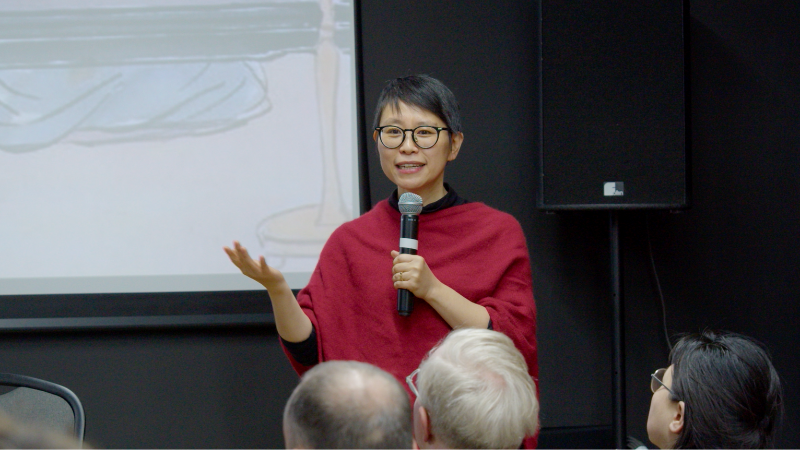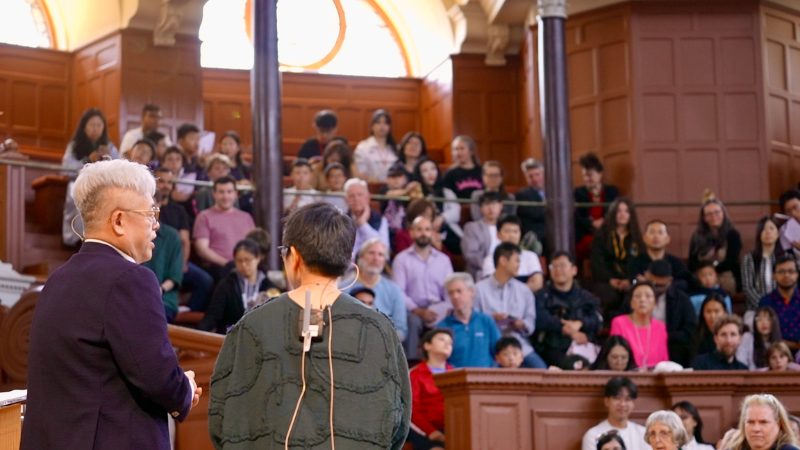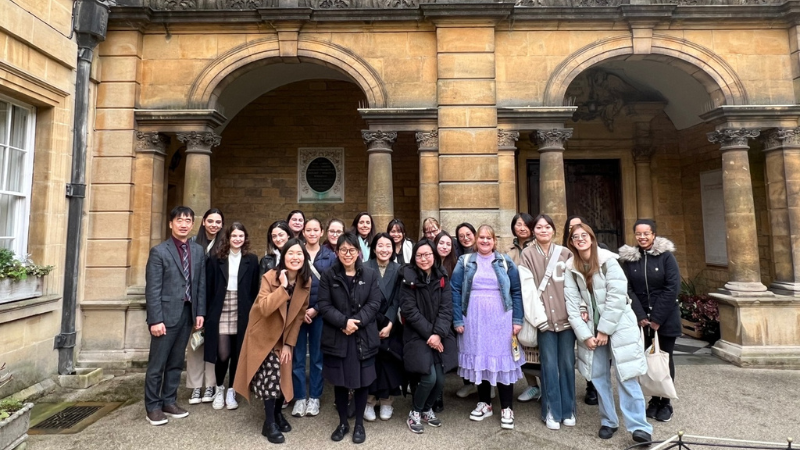- 한국어
- English
- 日本語
- 中文
- العربية
- Español
- Français
- Deutsch
- Pусский
- Tiếng Việt
- Indonesian
By Honorary Reporter Ayushi Kharayat from India
Photos = Jieun Kiaer
Intrigued by the idea of a Korean equivalent to the alphabet song, Jieun Kiaer, a linguistics professor at the University of Oxford in the U.K., and award-winning composer Kim Hyung-suk created the "Ganada Song." Released in July on major streaming platforms, the song got its name from "ga," "na" and "da," the first three letters of the Korean alphabet Hangeul.
A specialist in Hallyu (Korean Wave), the professor has promoted Korean culture in the U.K. through initiatives like the UK Hallyu Academy, a 10-week program launched in February that offers an immersive exploration of Korean culture from food to clothing.
The following are excerpts from an email interview with Kiaer from July 27 to Aug. 20.

Jieun Kiaer is a professor of Korean linguistics at Oxford University.
Briefly describe your background and your academic specialty.
I am a linguist focused on uncovering universal principles across languages. While studying in Korea, I was initially drawn to European languages but during my doctoral studies in the U.K., I became intrigued by the linguistic patterns of Asian languages, particularly as many Western theories fell short of explaining them.
I found out that Korean is often considered one of the hardest languages to learn, but the rise of Hallyu has made it Korean one of the most popular. I am particularly fascinated by how the culturally inspired teaching of language can equip learners with essential pragmatic knowledge.
What went into the creation of the "Ganada Song?"
While a Korean consultant for the Oxford English Dictionary, I noticed a surge in the use of new Korean words in global conversations, highlighting how Korean is relevant beyond just Koreans. Our goal was to combine K-pop with education to create a lasting impact for Korea enthusiasts. Many in my generation learned English through pop songs, and I believed that using K-pop to teach Korean could be just as effective.
How was working on the song with a famous composer like Kim Hyung-suk?
I thoroughly enjoyed working with him; my expertise in Korean linguistics ensured the educational value of the lyrics, while Kim infused the song with a touch of the Beatles' iconic sound to make it engaging and appealing. Together, we aimed to create a song that was both fun and effective for teaching Korean.

Composer Kim Hyung-suk (left) and Oxford University professor Jieun Kiaer on July 4 give a lecture on K-pop at Oxford's Sheldonian Theatre to mark the release of the "Ganada Song."
Why did you blend Korean and English in the song?
The song blends Korean and English lyrics to introduce Hangeul while conveying a message of diversity and unity. I aimed to make the Korean portion witty and enjoyable, while the English lyrics highlight K-pop's role in promoting diversity and solidarity. Hallyu represents a mix of languages, and this cross-cultural exchange is central to K-pop.
How is Korean culture gaining popularity in the U.K.?
I am working closely with Oxford and the U.K. Department for Education to enhance language education in British schools. While other languages have seen a decline, Korean has seen its number of learners triple over the past three years. This has sparked curiosity among language educators in the U.K., who acknowledge that culture-driven language learning is the most effective method.

Professor Jieun Kiaer and students at the UK Hallyu Academy pose for a group photo at Oxford University's Hertford College on Feb. 3, 2024.
What personal experiences have driven your passion for promoting Korea?
I arrived in London 23 years ago as a Ph.D. student at a time when Korean restaurants were scarce and understanding of Korea was limited, often reduced to the question "Are you from North or South Korea?" Witnessing the transformation of Hallyu in the U.K. thanks to the popularity of Korean cuisine, dramas, cinema and pop has astonished me.
What are your long-term goals for spreading Hallyu?
Inspired by independence activist Kim Gu, my mission is to contribute to Korea's rise as a cultural power, fulfilling his vision here in the U.K. I want to create a lasting cultural legacy to make Korea a true cultural leader.
msjeon22@korea.kr
*This article is written by a Korea.net Honorary Reporter. Our group of Honorary Reporters are from all around the world, and they share with Korea.net their love and passion for all things Korean.